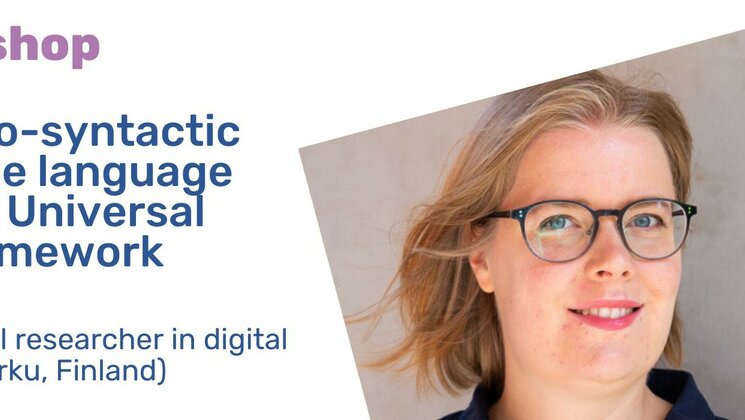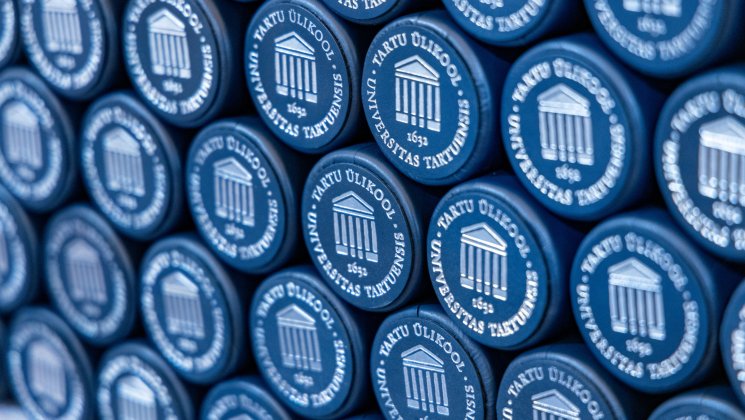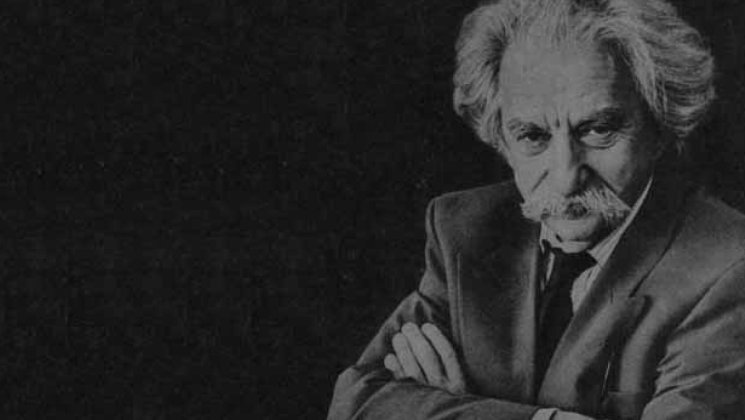-
Faculty of Arts and HumanitiesDean's Office, Faculty of Arts and HumanitiesJakobi 2, r 116-121 51005 Tartu linn, Tartu linn, Tartumaa EST0Institute of History and ArchaeologyJakobi 2 51005 Tartu linn, Tartu linn, Tartumaa EST0Institute of Estonian and General LinguisticsJakobi 2, IV korrus 51005 Tartu linn, Tartu linn, Tartumaa ESTInstitute of Philosophy and SemioticsJakobi 2, III korrus, ruumid 302-337 51005 Tartu linn, Tartu linn, Tartumaa EST0Institute of Cultural ResearchÜlikooli 16 51003 Tartu linn, Tartu linn, Tartumaa EST0Institute of Foreign Languages and CulturesLossi 3 51003 Tartu linn, Tartu linn, Tartumaa EST0School of Theology and Religious StudiesÜlikooli 18 50090 Tartu linn, Tartu linn, Tartumaa EST0Viljandi Culture AcademyPosti 1 71004 Viljandi linn, Viljandimaa EST0Professors emeritus, Faculty of Arts and Humanities0Associate Professors emeritus, Faculty of Arts and Humanities0Faculty of Social SciencesDean's Office, Faculty of Social SciencesLossi 36 51003 Tartu linn, Tartu linn, Tartumaa EST0Institute of EducationJakobi 5 51005 Tartu linn, Tartu linn, Tartumaa EST0Johan Skytte Institute of Political StudiesLossi 36, ruum 301 51003 Tartu linn, Tartu linn, Tartumaa EST0School of Economics and Business AdministrationNarva mnt 18 51009 Tartu linn, Tartu linn, Tartumaa EST0Institute of PsychologyNäituse 2 50409 Tartu linn, Tartu linn, Tartumaa EST0School of LawNäituse 20 - 324 50409 Tartu linn, Tartu linn, Tartumaa EST0Institute of Social StudiesLossi 36 51003 Tartu linn, Tartu linn, Tartumaa EST0Narva CollegeRaekoja plats 2 20307 Narva linn, Ida-Virumaa EST0Pärnu CollegeRingi 35 80012 Pärnu linn, Pärnu linn, Pärnumaa EST0Professors emeritus, Faculty of Social Sciences0associate Professors emeritus, Faculty of Social Sciences0Faculty of MedicineDean's Office, Faculty of MedicineRavila 19 50411 Tartu linn, Tartu linn, Tartumaa ESTInstitute of Biomedicine and Translational MedicineBiomeedikum, Ravila 19 50411 Tartu linn, Tartu linn, Tartumaa ESTInstitute of PharmacyNooruse 1 50411 Tartu linn, Tartu linn, Tartumaa ESTInstitute of DentistryL. Puusepa 1a 50406 Tartu linn, Tartu linn, Tartumaa ESTInstitute of Clinical MedicineL. Puusepa 8 50406 Tartu linn, Tartu linn, Tartumaa ESTInstitute of Family Medicine and Public HealthRavila 19 50411 Tartu linn, Tartu linn, Tartumaa ESTInstitute of Sport Sciences and PhysiotherapyUjula 4 51008 Tartu linn, Tartu linn, Tartumaa ESTprofessors emeritus, Faculty of Medicine0associate Professors emeritus, Faculty of Medicine0Faculty of Science and TechnologyDean's Office, Faculty of Science and TechnologyVanemuise 46 - 208 51003 Tartu linn, Tartu linn, Tartumaa ESTInstitute of Computer ScienceNarva mnt 18 51009 Tartu linn, Tartu linn, Tartumaa ESTInstitute of GenomicsRiia 23b/2 51010 Tartu linn, Tartu linn, Tartumaa ESTEstonian Marine Institute0Institute of PhysicsInstitute of ChemistryRavila 14a 50411 Tartu linn, Tartu linn, Tartumaa ESTInstitute of Mathematics and StatisticsNarva mnt 18 51009 Tartu linn, Tartu linn, Tartumaa EST0Institute of Molecular and Cell BiologyRiia 23, 23b - 134 51010 Tartu linn, Tartu linn, Tartumaa ESTTartu ObservatoryObservatooriumi 1 61602 Tõravere alevik, Nõo vald, Tartumaa EST0Institute of TechnologyNooruse 1 50411 Tartu linn, Tartu linn, Tartumaa ESTInstitute of Ecology and Earth SciencesJ. Liivi tn 2 50409 Tartu linn, Tartu linn, Tartumaa ESTprofessors emeritus, Faculty of Science and Technology0associate Professors emeritus, Faculty of Science and Technology0Area of Academic SecretaryHuman Resources OfficeÜlikooli 18, ruumid 302 ja 304 50090 Tartu linn, Tartu linn, Tartumaa EST0Area of Head of FinanceFinance Office0Area of Director of AdministrationInformation Technology Office0Administrative OfficeÜlikooli 17 (III korrus) 51005 Tartu linn, Tartu linn, Tartumaa EST0Estates Office0Marketing and Communication OfficeÜlikooli 18, ruumid 102, 104, 209, 210 50090 Tartu linn, Tartu linn, Tartumaa EST0Area of Vice Rector for DevelopmentCentre for Entrepreneurship and InnovationNarva mnt 18 51009 Tartu linn, Tartu linn, Tartumaa EST0University of Tartu Natural History Museum and Botanical GardenVanemuise 46 51003 Tartu linn, Tartu linn, Tartumaa EST0International Cooperation and Protocol Office0University of Tartu MuseumLossi 25 51003 Tartu linn, Tartu linn, Tartumaa EST0Area of RectorRector's Strategy OfficeInternal Audit OfficeArea of Vice Rector for Academic AffairsOffice of Academic AffairsUniversity of Tartu Youth AcademyUppsala 10 51003 Tartu linn, Tartu linn, Tartumaa ESTStudent Union OfficeÜlikooli 18b 51005 Tartu linn, Tartu linn, Tartumaa EST0Centre for Learning and TeachingArea of Vice Rector for ResearchUniversity of Tartu LibraryW. Struve 1 50091 Tartu linn, Tartu linn, Tartumaa ESTGrant Office
Doctoral defence: Mari Aigro “In any case? Estonian spatial cases as argument markers”
On 9 December at 11:00 Mari Aigro will defend her doctoral thesis “In any case? Estonian spatial cases as argument markers”.
Supervisors:
Associate Professor Virve-Anneli Vihman, University of Tartu
Merilin Miljan, Tallinn University
Opponent:
Professor Dagmar Divjak, University of Birmingham (United Kingdom)
Summary
What are Estonian spatial cases doing in the company of verbs?
Language speakers are not often aware of the fact that using certain verbs requires using certain case affixes – the selection of which depends on the verb. The Estonian verb “vaatama“ (“watch“) requires its object to be in partitive case while “unistama” (“dream about”) takes an argument in elative case (“out of”). We as Estonian speakers know which case to use, but we do not know why we select the ones we do. What are the inner dynamics of the system around verbs and cases? Why are spatial cases (e.g. elative) used with verbs when they do not express spatial meaning, for instance “Ma unistan pitsa-st” (“I am dreaming about pizza”).
Verbs express events or states that commonly have participants. Phrases referring to these participants are known as verbal arguments. For instance, “sööma” (“eat”) takes two arguments – the eater and the eaten. Without them, the verb would not have meaning. The cases on these two phrases depend on the verb. Each verb therefore has an argument structure, i.e. selects particular cases in a particular configuration, letting us know, what is involved in the event described by the verb. “Vaatama” (“watch”) has a structure with a nominative subject and a partitive object. The structure of “unistama” (“dream about”), however, includes a nominative subject and an elative argument.
This thesis conducts corpus-based and experimental studies to investigate the role of argument structures with spatial cases in Estonian. It focusses on the three main variables of different structures: verbs, cases and argument status.
First, there is reason to think that different structures occur with different types of verbs. It is not clear, however, in what ways these verbs are distinct in Estonian. We found that verbs in spatial case argument structures (“unistama” – “dream about”) are must more stative than verbs in more common argument structures (“sööma” – “eat”). We also found that most spatial cases no longer have spatial meaning when marking verbal arguments.
Second, we asked, which spatial cases are most commonly used for marking verbal arguments and least commonly used for marking spatial meaning. The more a case marks arguments, the more grammaticalized it is. We found that elative (“out of”) and allative (“onto”) are so grammaticalized that they are infrequently used for referring to space. Instead, they are used for talking about other types of meaning and relationships, including argumenthood.
Third, the thesis investigated the strength of argument status in various functions of spatial cases. Mainstream linguistic theory often regards canonical objects (e.g. partitive objects in Estonian) as stronger arguments than non-canonical arguments (e.g. the elative argument of “unistama” – “dream about”). Our experiment showed that such structures include equally strong arguments and that case has little to do with argument status. This link is weaker for phrases expressing concrete locations, being dependant on their various semantic aspects.
All in all, the thesis provides us with an abundance of new knowledge about how Estonian spatial cases function in the service of verbs. These results are highly relative to cross-linguistic knowledge about argument status and morphologically rich languages such as Estonian are crucial for studies on the link between morphology and argument status.
The defence can be also followed in Zoom: https://ut-ee.zoom.us/j/99200008062?pwd=ci9mMXR6R1hLSG1TSUVGQXVLRDdRdz09 (Meeting ID: 992 0000 8062; Password: 329308).
Doctoral defence: Mari Aigro “In any case? Estonian spatial cases as argument markers”

A multi-day practical workshop on automatic morpho-syntactic annotation is coming up

Doctoral defence: Lydia Risberg "The meanings of words and the dictionary. The impact of the usage-based approach on Estonian language planning"

